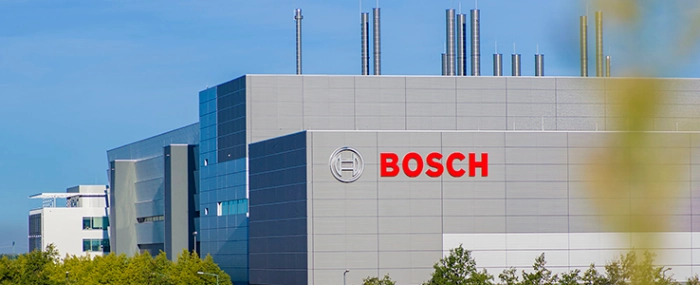
© Robert Bosch GmbH
Business |
Bosch's massive wafer fab in Dresden is ready for production
It's described as a milestone. Soon silicon wafers will be passing through the fully automated fabrication process for the first time at Bosch's semiconductor fab in Dresden.
Construction of the facility began in June 2018 on a plot of land measuring some 100,000 square meters, or roughly 14 football pitches. It is located in Silicon Saxony, which is Dresden’s answer to Silicon Valley. In late 2019, the outer shell of the high-tech factory was completed, providing 72,000 square meters of floor space. Work then began on the interior and the first production machinery was installed in the clean room. In November 2020, initial parts of this highly sophisticated fabrication technology completed a brief automated manufacturing cycle for the first time.
In January 2021, Bosch began putting its first wafers through the fabrication process in Dresden. From these, the company will make power semiconductors for use in applications such as DC-DC converters in electric and hybrid vehicles, a press release reads.
This is a key step toward the start of production operations, which is scheduled for late 2021. Manufacturing of automotive microchips will be a primary focus when the fully digital and highly connected semiconductor plant is up and running.
“Chips for tomorrow’s mobility solutions and greater safety on our roads will soon be produced in Dresden. We plan to open our chip factory of the future before the year is out,” says Harald Kroeger, member of the board of management of Robert Bosch GmbH, in the press release.
Bosch is investing around one billion euros in the high-tech manufacturing facility. Funding for the new building is being provided by the federal German government, and more specifically the Federal Ministry for Economic Affairs and Energy. Bosch plans to officially open its wafer fab in June 2021.
In the six weeks it takes to produce the wafers, they undergo some 250 individual fabrication steps – all of which are fully automated. In the process, minute structures with dimensions measuring fractions of a micrometer are deposited on the wafers. These microchip prototypes can now be installed and tested in electronic components for the first time. In March, Bosch will start the first production runs of highly complex integrated circuits. To make the wafers into the finished semiconductor chips, they undergo some 700 processing steps, which take more than ten weeks to complete. But even if the process is fully automated, some 700 people will be working at the Dresden fab to control and monitor production and maintain the machinery.
The technology in focus at Bosch’s new Dresden facility is 300-millimeter fabrication, in which a single wafer can accommodate 31,000 individual chips. Compared with conventional 150- and 200-millimeter wafers, this technology offers the company greater economies of scale and boosts its competitiveness in semiconductor production.


